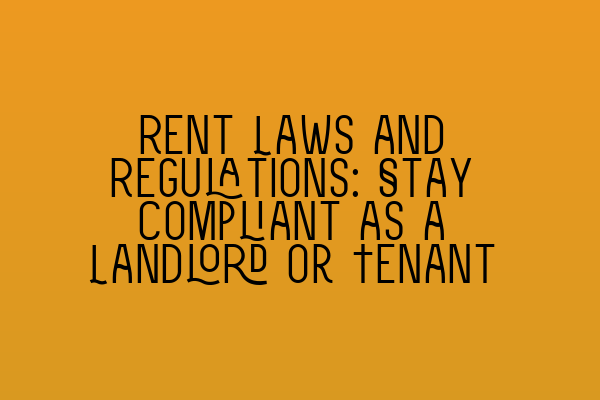Rent Laws and Regulations: Stay Compliant as a Landlord or Tenant
As a landlord or tenant, it is essential to understand and stay compliant with rent laws and regulations. Failure to do so can lead to legal issues, financial penalties, and unnecessary stress. Whether you are a property owner or a tenant, this blog post will provide you with the necessary information to navigate the complex world of rent laws and regulations with confidence.
1. Know the Different Types of Tenancy Agreements
To stay compliant with rent laws, it is crucial to understand the different types of tenancy agreements. The most common types include Assured Shorthold Tenancy (AST), Assured Tenancy, and Common Law Tenancy. Each type has specific rules and regulations that both landlords and tenants must adhere to.
2. Understand Rent Control Laws
Rent control laws vary from one jurisdiction to another. It is important to familiarize yourself with the specific rent control regulations in your area. Some areas impose limits on how much a landlord can increase the rent annually. Others have stricter rent control laws that control not only the rent but also the eviction process. It is important to know the rules in your location to avoid any legal issues.
3. Familiarize Yourself with Security Deposit Laws
In many countries, landlords are required to collect a security deposit from tenants. These deposits serve as a form of financial protection for landlords in case of damage to the property or unpaid rent. However, there are regulations in place to protect tenants from unfair retention of their security deposit. Understanding the laws surrounding security deposits will help landlords avoid disputes and tenants recover their deposits promptly.
4. Ensure Compliance with Health and Safety Regulations
As a landlord, you have a legal and moral duty to provide a safe and habitable environment for your tenants. This includes complying with health and safety regulations such as regular inspections, fire safety measures, and providing adequate heating and ventilation. Failure to meet these standards can result in penalties and potential legal action. Regular inspections, prompt repairs, and proper maintenance are integral to staying compliant with these regulations.
5. Stay Updated with Eviction Laws
Eviction laws can be complex and vary from one jurisdiction to another. It is crucial for both landlords and tenants to understand the legal grounds for eviction and the proper procedures to follow. Landlords must ensure they have valid reasons for eviction, such as non-payment of rent or lease violations, and comply with the correct eviction procedure outlined by law. Tenants, on the other hand, have the right to challenge eviction notices if they believe they are unjust.
6. Seek Professional Advice
Navigating rent laws and regulations can be challenging, especially if you are not familiar with the legal complexities involved. It is always a good idea to seek professional advice from a qualified solicitor specializing in property law. They can provide you with expert guidance tailored to your specific situation, ensuring that you stay compliant and avoid costly legal disputes.
In conclusion, understanding and staying compliant with rent laws and regulations is crucial for both landlords and tenants. Familiarize yourself with the different types of tenancy agreements, rent control laws, security deposit regulations, health and safety requirements, eviction laws, and seek professional advice when needed. By doing so, you can protect your rights, avoid legal issues, and contribute to a fair and harmonious renting experience.
Related Articles:
– Parties in a Contract: Rights and Responsibilities
– Unveiling Duress and Undue Influence in Contracts
– Essentials of Consideration: Understanding the Backbone of Contracts
– Damages in Contract Law: Assessing Financial Compensation
– Express and Implied Terms in Contracts: Decoding Agreement Components
